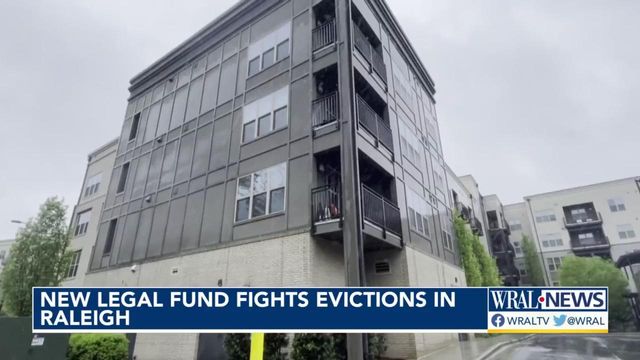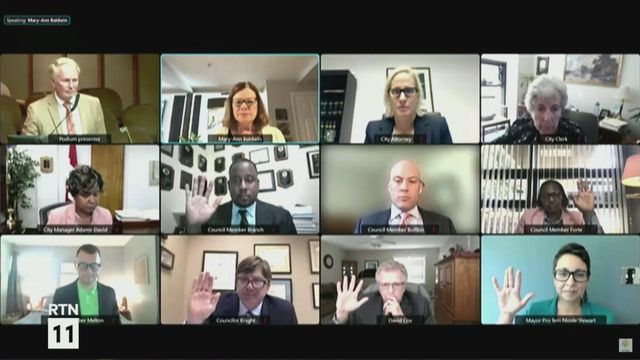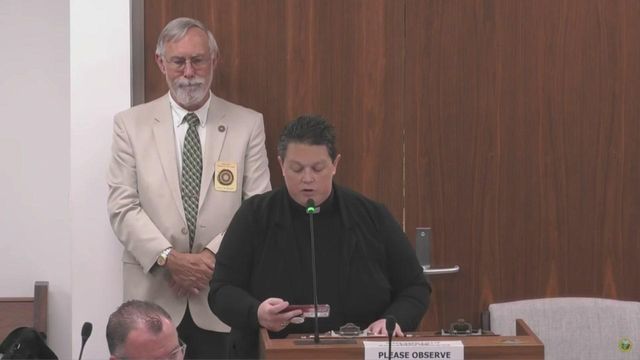Raleigh City Council approves $500K to help keep renters in homes
The Raleigh City Council on Tuesday unanimously approved spending $500,000 on a program to help renters by preventing evictions and providing legal support for those who face losing their homes.
The federal funding comes from the American Rescue Plan Act of 2021. City documents show the plan calls for $300,000 to be spent on an eviction prevention program and $200,000 for tenant lawsuit settlement assistance.
Campbell Law School is set operate the “City of Raleigh Housing Justice Project” for three years. Law students will represent renters who are facing eviction in court.
“For me, it comes back to this was a problem before the pandemic, so it’s going to keep being a problem,” said Raleigh Mayor Pro Tem Nicole Stewart. “So, the need is there regardless of the pandemic, and it’s now something we know we can address with these federal dollars we have.”
A pandemic-related moratorium on evictions in North Carolina ended in July 2021.
In April 2022, the U.S. Census Bureau Household Pulse Survey found:
- 9.4% of North Carolina renter households said they’re behind on rent
- 10.8% of renters say they’re very likely to get evicted in the next two months
- 43.7% say somewhat likely to get evicted in the next two months.
Citing the North Carolina Legal Needs Assessment, Campbell Law School Dean J. Rich Leonard said the “funding for legal services to address North Carolinians’ civil legal needs is severely inadequate,” and “the gap between service need and service availability has reached a crisis stage.”
"It's a massive problem and we're a small part of the solution," Leonard said.
District B Councilmember David Cox mentioned how approximately 3,100 renters are awaiting funds from Wake County's COVID rental assistance program.
"We have a very urgent matter, a very time-sensitive matter of trying to help these people get their applications completed so that they can receive assistance," Cox said.
Cox mentioned the possibility of using the Raleigh Convention Center to host workshops to help people complete their applications.
Staffing shortages in the police and fire departments
On Tuesday, city council also discussed pay for city employees. It comes after firefighters and police officers protested in April for better pay outside the Raleigh Municipal Building.
Last month, the Raleigh City Council approved a 2% cost-of-living adjustment for full-time employees.
"I am concerned with the vacancies, and like it or not, that has to do with pay, that has to do with competition," District E Councilmember David Knight said. "And as well, I get we're in a very strange time now in terms of just jobs in general and how people work and want to work and where to work."
Knight said he believes Raleigh is a market where the city may have to pay more for personnel in its fire and police departments compared to the past.
"I don't think the public is going to want a continued understaffing in these two departments," Knight said. "They are as essential as it gets."
Last month, Raleigh Fire Chief Herbert Griffin said his department had 55 vacancies. As of April, the Raleigh Police Department has 168 vacancies.
Cox asked what success looks like when it comes to the city's staffing for public safety.
"The truth is, we're not there yet," Cox said.
Cox also claimed both fire and police department haves had more personnel leave since the city council passed the 2% cost-of-living increase on April 19. He mentioned how city staff did not provide the specific information in the agenda materials for Tuesday's meeting.
Proposed changes to the structure of the city council
On Tuesday, city of Raleigh Chief of Staff Louis Buonpane presented findings of a study that propose several changes to the structure of the city council.
It includes:
- Transitioning from two-year to four-year terms
- Adopting staggered terms where all district city councilmembers are elected on one cycle and all At-Large city councilmembers are elected on the other side of the cycle
- Increase total compensation for the mayor and the city council
- Direct staff to develop and implement a comprehensive voter engagement program
- Increase the city council size to nine members by adding an additional district seat
Because most of the proposed changes wouldn't take effect until 2024, Mayor Mary-Ann Baldwin asked for city staff to bring the proposals for city council term lengths and city council size before the council in early 2023.
However, the pay increases would take effect in December when new councilmembers are in office.
The study group recommends compensating the mayor and city councilmembers as follows:
- For the mayor:
- Total compensation: $45,911
- Annual mayor stipend: $36,511
- Annual expense allowance: $6,000
- Annual car allowance: $2,400
- Annual technology allowance: $1,000
- Total compensation: $45,911
- For city councilmembers:
- Total compensation: $37,248
- Annual city council stipend: $29,848
- Annual expense allowance: $4,000
- Annual car allowance: $2,400
- Annual technology allowance: $1,000
- Total compensation: $37,248
City councilmembers met virtually again on Tuesday after Baldwin tested positive for COVID-19 in mid-April. Tuesday’s meeting was virtual due to a rise in COVID-19 cases and recent exposures to the virus.











